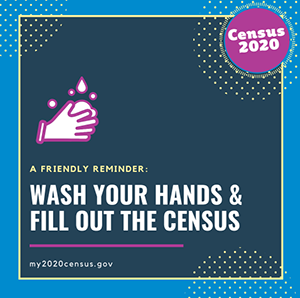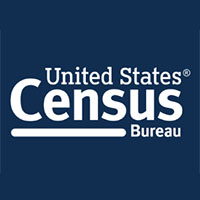— from Ellie Probus for Washington Census Alliance —

As the 2020 Census nears its close in October, Washington state will begin setting up its 2021 redistricting process. The task of revising legislative and congressional district lines happens every 10 years, and is necessary to ensure that each district has an equal number of residents based on the census count.
Since 1983, the Washington state redistricting process has been run by a five-person bipartisan Redistricting Commission. The Commission is composed of two Republican and two Democrat voting members (chosen by members of the legislature), as well as one non-voting chair. Over the course of a year, the Commission will review census population and demographic data, gather community input, and propose new district lines to the legislature. Legislators will then have an opportunity to make minor adjustments before ultimately ratifying the new district lines. At present, this process is scheduled to take place from January 2021-February 2022, but may be subject to change due to census operational delays caused by the COVID-19 pandemic.
While Washington’s bipartisan Redistricting Commission is designed to reduce partisan political influence and represent the interests of all Washington residents, the commission has historically been a homogeneous group composed primarily of political insiders with connections to state legislators. In the four iterations of the Redistricting Committee over the last 50 years, all members have been white, and only three women have ever served as voting members.
This lack of representation is a major concern for communities of color in light of the practice of race-based gerrymandering in the United States. Recent and well-publicized instances of racial gerrymandering in Wisconsin and North Carolina highlight the strategy of “packing” Democratic-leaning voters of color into few districts where Democrats will win by a landslide, thus pulling voters of color out of surrounding districts. As a result, these surrounding districts become more likely to lean Republican—so while Democratic voters may win the popular vote, Republican voters can maintain a lead by district count.
In Washington state, the controversial 2011 decision by the Redistricting Commission to split the Yakama Nation reservation between two districts highlights the importance of race in the redistricting process. Patricia Whitefoot, an Elder in the Yakama Nation, long time community advocate and former President of the National Indian Education Association, stated:
“During the last Census and subsequent Redistricting 10 years ago, the Yakama Nation reservation was split in half, which diluted and created some confusion in our vote as Tribal citizens. Because the reservation area was split into the 14th or 15th Legislative District, some of us were reassigned and identified with the City of Yakima area. There is a major difference between the city of Yakima and the vast, rural area of the Yakama Nation reservation and our original homelands, where our tribal members live.”
While the Redistricting Commission is set to be formally appointed in January 2021, conversations in the legislature to identify members have already begun. But according to Washington State Speaker of the House Laurie Jinkins, the legislature has not yet established a shortlist of candidates as of late June. In a meeting with community organizations on June 23, Jinkins also stated that increasing representation on the Commission is a priority for her: “I am hopeful that we will have a group working on redistricting that is fairly diverse.”
To ensure that the interests of communities of color are represented this year, community-based organizations and tribes in Washington are calling on the legislature to prioritize appointing members of color and women as voting members of the Redistricting Commission. Political Destiny is a faith-based community group committed to responding to the economic, social and political needs of the marginalized communities in Pierce County. Jacquelyn Harris, Programs Administrator for PEARS, its sister organization, stated: “The racial composition of past Commissions have not reflected the diverse communities of our legislative districts. It is important to me that members of the Commission look like us and share our experiences to effectively represent our communities during this process.”
Denisse Guerrero, Field Organizer for the Washington Census Alliance, added: “This is more than the make-up of the commission, these lines will affect the representation of our communities for the next decade. We’ve seen how change and legislation can happen in a matter of days or weeks. We need to make sure that our communities are represented and protected this can only happen if our commission reflects the values of our people as well.”
Patricia Whitefoot of the Yakama Nation has made a pointed call for tribal representation on the Commission: “I strongly recommend that the state’s Redistricting 5-member Commission consider appointment of a state Tribal Representative. The fact that the 29 Tribes are representative of the 4th largest contributor to the state’s economy is reason enough to appoint a Tribal Representative.”
In addition to speaking out about the need for equitable representation on the Commission, Political Destiny has begun the process of holding public meetings to educate Pierce County residents about the redistricting process and gathering feedback about community priorities. This will be used to provide organized and representational feedback to the Redistricting Commission as they gather public comments (currently scheduled for summer of 2021).
A coalition of organizations including the Washington Voting Justice Coalition, the Washington Census Alliance, and League of Women Voters of Washington worked to pass legislation increasing transparency, public access, and accountability in the redistricting commission process (HB 2575). The legislation would have ensured language accessibility at public feedback sessions, as well as requiring the Redistricting Commission to publicly disclose their specific criteria for district lines. Sedonia Young, Voter Registration and Education Advocate for Political Destiny, noted: “We, like other Organizations and Communities of Color, believe the Redistricting Commission should be expanded to include geographic, political and ethnic diversity representation throughout the process.” While this legislation was not passed, the coalition will be continuing to advocate for an open and transparent process including calling for representation in the nominations for the commission.
About the Washington Census Alliance
The Washington Census Alliance is a statewide coalition of 90 organizations led by and working in communities of color. It advocates for the unique needs of our communities. Together, we’re launching an unprecedented relational organizing campaign to ensure that historically undercounted communities throughout Washington state are counted in the 2020 census.
**If you are reading theOrcasonian for free, thank your fellow islanders. If you would like to support theOrcasonian CLICK HERE to set your modestly-priced, voluntary subscription. Otherwise, no worries; we’re happy to share with you.**









1. I am appalled that so few have completed the census. It’s critically important and takes about 4 minutes. It’s not as if the census hasn’t been advertised enough.
2. I am also appalled at gerrymandering, which seems to be increasing with the worst intentions.
In the 70s, I worked with an operations research group that developed one of the original districting programs. We humans had to intervene when the computer produced odd districts that had unintended consequences, but generally the computer did a fine job. Back then, there was a lot of concern about campaigning distances, etc., but in this age that hardly matters. 50 years have passed and the tech has only improved.
Let a computer do it.